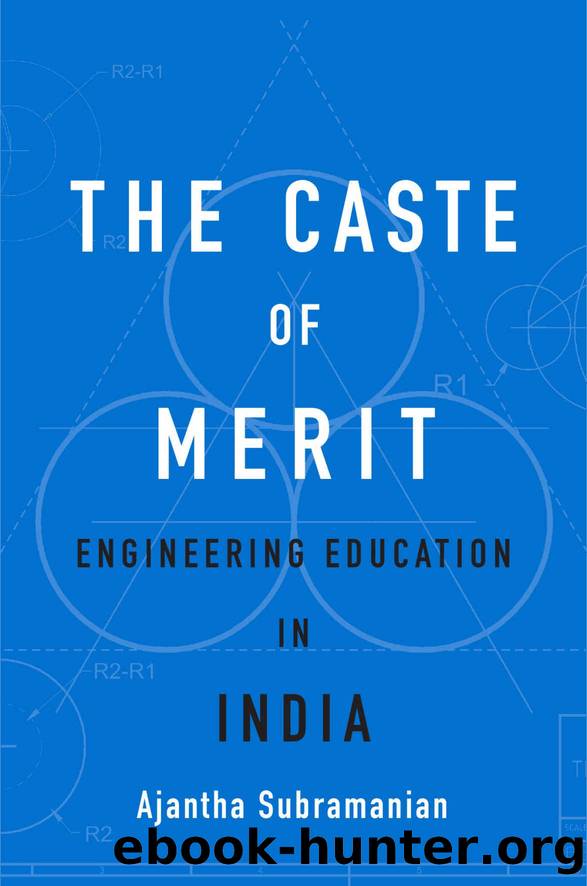The Caste of Merit by Ajantha Subramanian

Author:Ajantha Subramanian [Subramanian, Ajantha]
Language: eng
Format: epub
ISBN: 9780674987883
Publisher: Harvard University Press
Published: 2019-12-02T18:30:00+00:00
While he acknowledged that this cavalier attitude toward an IIT education is not limited to students from Hyderabad or Kota, it was this subset that he singled out for comment. It was they who embodied a kind of intellectual inertia and premature sense of arrival that he feared would âinfectâ their peers, precipitating a downward spiral of declining standards.
The term âinfectionâ is a striking metaphor indeed. It casts âthe coachedâ as an alien intrusion in the corporate institutional body that threatens to weaken it from within. The ex-director was not alone in holding this opinion. Such sentiments and concerns about âthe coachedâ are also echoed by alumni. Chatterjee, an alumnus from the 1980s who is now a professor at MIT, noted that IIT alumni currently doing their PhDs under him described peers who had come through four years of coaching as âjust so intellectually tired that they didnât work very hard in IITs.â This was not the fault of the institutions, Chatterjee quickly added, because âthe IITs cannot provide a value system that society does not by and large have.⦠I mean, there were a few professors at IIT who did a very good job of teaching us, okay? There were a few of them that took personal interest in some of us and so forth and so on. But thatâs not why IIT was great at the time. It was because of students and their interaction with each other.â
What do we make of this sense of an erosion of values and its threat to the collective enterprise of peer learning and exceptional ambition? What values are supposedly in decline because of the coaching industry and its âburned outâ products?
The key value that alumni and administrators identify as under threat is that of engineering education as a process of holistic intellectual formation. Many spoke of âcoaching factoryâ students as overly instrumental in their approach to the IITs and attributed this to a fundamentally different orientation toward knowledge. Chatterjee recalled that when he went back to receive the Distinguished Alumnus prize at his alma mater, âthe one thing the faculty complained about is that the exam doesnât test intrinsic intelligence anymore as much as it tests how much practice youâve had.â As we have seen many times over, this is a well-worn contrast between knowledge as an expression of innate conceptual intelligence and knowledge as a mechanistic, embodied practice. The very notion of a âcoaching factoryâ reinforces this mind-body distinction: its students are likened to the mass-produced commodities of the industrial shopfloor, which are defined by their generic, unexceptional quality.
The mechanistic approach to knowledge bred by the coaching industry is associated with a narrowing of intellectual horizons. Shankar, a professor in the Humanities Department at IIT Madras and a 1980s alumnus, mentioned a debate competition for which he was one of the judges. âWe heard about 30 students do their 2-minute, 3-minute speeches,â he recalled, âand we were shocked by the quality of debate.⦠Some of them were reading off their notes and just the body language and the ability to communicate seemed too inadequate.
Download
This site does not store any files on its server. We only index and link to content provided by other sites. Please contact the content providers to delete copyright contents if any and email us, we'll remove relevant links or contents immediately.
| Anthropology | Archaeology |
| Philosophy | Politics & Government |
| Social Sciences | Sociology |
| Women's Studies |
Nudge - Improving Decisions about Health, Wealth, and Happiness by Thaler Sunstein(6629)
iGen by Jean M. Twenge(4693)
The Fire Next Time by James Baldwin(4336)
Adulting by Kelly Williams Brown(3663)
The Sports Rules Book by Human Kinetics(3581)
The Hacking of the American Mind by Robert H. Lustig(3575)
The Ethical Slut by Janet W. Hardy(3494)
Captivate by Vanessa Van Edwards(3292)
Mummy Knew by Lisa James(3164)
In a Sunburned Country by Bill Bryson(2941)
Ants Among Elephants by Sujatha Gidla(2920)
The Worm at the Core by Sheldon Solomon(2910)
Suicide: A Study in Sociology by Emile Durkheim(2606)
The Slow Fix: Solve Problems, Work Smarter, and Live Better In a World Addicted to Speed by Carl Honore(2570)
Humans of New York by Brandon Stanton(2376)
Handbook of Forensic Sociology and Psychology by Stephen J. Morewitz & Mark L. Goldstein(2376)
Blackwell Companion to Sociology, The by Judith R. Blau(2314)
The Happy Hooker by Xaviera Hollander(2272)
Outliers by Malcolm Gladwell(2254)
